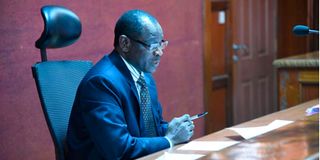
Elijah Obuong, Brian Oduor, Benjamin Imbai and Jack Onyango, who went missing on April 19, 2021.
| PoolNews
Premium
Last seen in handcuffs, next in body bags: Why police are under scrutiny
What you need to know:
- The law does not criminalise "enforced" disappearances and for a habeas corpus application to be successful in court, the applicant must provide evidence that the suspect had been in police custody by the time they were discovered missing.
There is increasing suspicion of police involvement in the disappearance and eventual killing of the now infamous Kitengela four, Somali-American businessman Bashir Mohamed and some youth in Mathare, which has shone a light on why cases of enforced disappearances are still rampant in the country.
Jack Anyango, 37, Elijah Obuong, 35, Benjamin Imbai, 30, and Brian Oduor, 36, who went missing on April 19, were found dead and their bodies in different stages of decomposition. Anyango is still missing.
His mother, Ms Olga Ochieng, is still hopeful that her son will return home, two months since the four friends were picked up by unknown people believed to be police officers outside a bar in Kitengela town.
Police linked the four to a motor vehicle theft and kidnapping syndicate.
The long wait for her son to return home is a painful one and unlike the parents of the other three who know their sons died, Anyango’s mother is in agony, not knowing whether he is alive or dead. Last month, she and her daughter-in-law, Ms Monicah Mugo, were admitted to hospital for severe depression and miscarriage, respectively within 48 hours of each other.
Elsewhere in Nairobi, the Police Reforms Working Group raised the alarm over increasing cases of enforced disappearances with the latest case being of a young man named Collins, who was allegedly arrested by an officer known as Njoro in Mathare slums in Nairobi, only to be found killed. His body had been taken to City Mortuary. According to the lobby group, Collins was killed for allegedly witnessing the killing of another young man, Dominic Kalema.
Collins’ body then mysteriously disappeared from the mortuary, before a post-mortem could be conducted.
So far, police have been silent on Bashir’s killing, although a post-mortem showed that he was tortured before he was strangled with bare hands and his body dumped in River Nyamindi in Mwea, Kirinyaga County.
Bashir’s body was “discovered” a day before his lawyers could file a habeas corpus application seeking to have the court compel security agencies to reveal if he was being held by the state.
“We had prepared the application and were ready to file it on Friday, but for some reason, the court closed early and we missed the opportunity. Then on Saturday, we received the sad news,” Bashir’s lawyer, Mr Charles Madowo, told the Nation.

Police Reforms Working Group members, led by Haki Afrika Executive Director Khalid Hussein, address the media in Nairobi on May 2, 2021.
What the law says
The law does not criminalise "enforced" disappearances and for a habeas corpus application to be successful in court, the applicant must provide evidence that the suspect had been in police custody by the time they were discovered missing.
Habeas corpus generally applies to all cases of illegal confinement or detention in which any person is deprived of his liberty.
Many habeas corpus applications have failed to sail through in court for lack of evidence showing that the appellant was being held in state custody and for those that do, in most cases police officers do not strictly follow through the orders.
For example, Justice Chacha Mwita dismissed a habeas corpus application filed by the Law Society of Kenya in 2018 that was seeking the production of Brian Nzenze and Erickson Aluda Mambo, a pillion passenger and his boda boda rider, who were allegedly arrested by two Administration Police officers, who were then attached to the Kawangware chief’s camp, and bundled into a police land cruiser and driven off, an act that was witnessed by bystanders, but no one knew of their destination.
A search for them at Kabete, Kinoo, Kileleshwa, Muthangari and other police stations bore no fruit, forcing the LSK to file the habeas corpus application against the Attorney-General, the Director Public Prosecutions and the Inspector General of police.

Justice Chacha Mwita at the Milimani Law Courts on February 26, 2018
The two officers, however, denied knowing the two men, having arrested them and furthermore, their names did not feature in the station’s Occurrence Book (OB).
Justice Mwita noted that the laws of physics and chemistry do not accept that the body mass of a person can vanish into thin air without external factors.
“While the persons who cause the disappearance need not be state actors, the court should not lightly dismiss requests by aggrieved applicants to determine whether the circumstances of the disappearance are parts of a transaction involving illegal arrest and detention,” noted the judge.
In the ruling, however, he said he was not able to conclude that the two had been arrested by the AP officers, to justify an order of habeas corpus against the IG.
“It would appear the petitioner mixed up the procedures for approaching the court before and after the promulgation of the new constitution of Kenya, 2010. While an order for habeas corpus was previously sought by procedure for directions in the nature of habeas corpus under the criminal procedure code cap 75, the procedure under the new constitution is, a person who is detained or held in custody is entitled to petition for an order of habeas corpus,” ruled Justice Mwita.
Challenge for families
The dilemma for families, therefore, is how to meet this requirement for evidence when all they have are suspicions and patterns that point to enforced disappearances.
On the other hand, what happens to a family that watches their relative get arrested by the police, only to later discover that the arrest was never booked in the station’s OB?
Criminal Lawyer Dola Magani is of the opinion that the weakening of the criminal justice system as seen with police laxity in investigating persons reported to have disappeared is on one hand increasingly making Kenyans feel they have been denied their right to justice, and on the other hand, fuelling enforced disappearances, most of which end up unresolved.
He notes that cases of police officers arresting people and not booking them at the station's OB are commonplace, denying relatives justice in their search for missing loved ones.
Enforced disappearances are also convenient to errant security officers and political actors, providing a cover for other crimes, while its perpetrators avoid the inconvenience of scrutiny through investigations.
"Additionally, the use of human evidence in court has over time also proven not to be as efficient as scientific evidence, which has limited chances of error. This is what investigators should go for to reduce incidents of files being returned to them due to lack of sufficient evidence," said Mr Magani.
He further warns that murders may increase if the ones under probe are not solved soon.
"Criminals are watching and noting the trends in these cases. If something is not done to send them a message that killing will attract harsh penalties and cannot be tolerated, we could be headed to worse times," added Mr Magani.
United Nations Secretary General Antonio Guterres, while marking the International Day of victims of enforced disappearances last year, called on member states to observe the International Human Rights Law requirement that gives families and societies the right to know the truth about what happened to their relatives.
“With the support of international human rights mechanisms, states have a duty to strengthen their efforts to prevent enforced disappearances, to search for victims and to increase assistance to victims and their relatives. It is equally critical to pursue credible and impartial judicial investigations,” said Mr Guterres.
Lobby groups’ push
Lobby groups dealing with these cases are now calling on Parliament to pass a law to ensure that enforced disappearance is defined as a crime. It will then attract sanctions or sentences prescribed for different categories of disappearances.
"In order to deal conclusively with the issue of enforced disappearances, a robust legal framework that takes into account local circumstances should be enacted. This framework should be able to address legal hurdles attendant to habeas corpus applications which are difficult to prosecute for lack of supporting evidence,” said Mr Vincent Chahale, a legal manager with the International Justice Mission.

Vincent Chahale, International Justice Mission country director.
Mr Chahale further noted that digitisation of the Occurrence Books would be apt not only to provide evidence of arrest, place, time and station of custody, but also to deter would-be police perpetrators.
Additionally, Mr Chahale said there is need for more accountability around arrests, detentions and transportations made by the police. This might involve policies that require police officers to digitally record in real time any person they arrest whether or not they are taken to the station. Similarly, every arrested person should be recorded in the OB of the nearest police station in the jurisdiction of the arrest. A time limit within which an arrested person should be booked at the station should also be introduced.
"As a country, we also need to set up a dynamic and digitally accessible missing persons register to help in tracking cases of enforced disappearances. This would also provide a repository for follow up on cold cases. There is also a need for a national register of unclaimed bodies of deceased persons," he said.
Moreover, there is the matter of handling of unclaimed bodies. Even when found dead, most disappeared persons end up being buried unidentified, denying relatives any opportunity to know of their whereabouts.
The National Coroner Services Act, if implemented, will enable the office of the coroner general to spearhead centralised documentation of unclaimed bodies and cross-checking with missing persons.
Most disappearances start with an arrest, usually an illegal false arrest or abduction, extortion, illegal detention, torture, assault, grievous harm or an unlawful killing.





